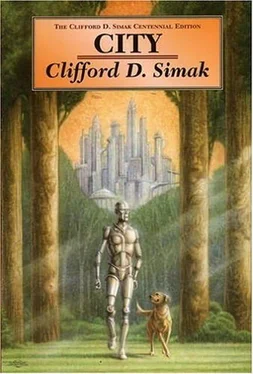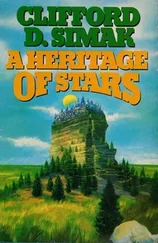Clifford Simak - City
Здесь есть возможность читать онлайн «Clifford Simak - City» весь текст электронной книги совершенно бесплатно (целиком полную версию без сокращений). В некоторых случаях можно слушать аудио, скачать через торрент в формате fb2 и присутствует краткое содержание. Жанр: Фантастика и фэнтези, на английском языке. Описание произведения, (предисловие) а так же отзывы посетителей доступны на портале библиотеки ЛибКат.
- Название:City
- Автор:
- Жанр:
- Год:неизвестен
- ISBN:нет данных
- Рейтинг книги:3 / 5. Голосов: 1
-
Избранное:Добавить в избранное
- Отзывы:
-
Ваша оценка:
- 60
- 1
- 2
- 3
- 4
- 5
City: краткое содержание, описание и аннотация
Предлагаем к чтению аннотацию, описание, краткое содержание или предисловие (зависит от того, что написал сам автор книги «City»). Если вы не нашли необходимую информацию о книге — напишите в комментариях, мы постараемся отыскать её.
City — читать онлайн бесплатно полную книгу (весь текст) целиком
Ниже представлен текст книги, разбитый по страницам. Система сохранения места последней прочитанной страницы, позволяет с удобством читать онлайн бесплатно книгу «City», без необходимости каждый раз заново искать на чём Вы остановились. Поставьте закладку, и сможете в любой момент перейти на страницу, на которой закончили чтение.
Интервал:
Закладка:
"I couldn't find a job," said Webster. "I've hunted for weeks and no one would have me. So, finally, I came here."
"You didn't want to come here?"
"No, frankly, I didn't. A placement service. It has, well... it has an implication I do not like."
Taylor smiled. "The terminology may be unfortunate. You're thinking of the employment services of the old days. The places where men went when they were desperate for work. The government operated places that tried to find work for men so they wouldn't become public charges."
"I'm desperate enough," confessed Webster. "But I still have a pride that made it hard to come. But, finally, there was nothing else to do. You see, I turned traitor-"
"You mean," said Taylor, "that you told the truth. Even when it cost you your job. The business world, not only here, but all over the world is not ready for that truth. The businessman still clings to the city myth, to the myth of salesmanship. In time to come he will realize he doesn't need the city, that service and honest values will bring him more substantial business than salesmanship ever did.
"I've wondered, Webster, just what made you do what you did?"
"I was sick of it," said Webster. "Sick of watching men blundering along with their eyes tight shut. Sick of seeing an old tradition being kept alive when it should have been laid away. Sick of King's simpering civic enthusiasm when all cause for enthusiasm had vanished."
Taylor nodded. "Webster, do you think you could adjust human beings?"
Webster merely stared.
"I mean it," said Taylor. "The World Committee has been doing it for years, quietly, unobtrusively. Even many of the people who had been adjusted don't know they have been adjusted.
"Changes such as have come since the creation of the World Committee out of the old United Nations have meant much human maladjustment. The advent of workable atomic power took jobs away from hundreds of thousands. They had to be trained and guided into new jobs, some with the new atomics, some into other lines of work. The advent of tank farming swept the farmers off their land. They, perhaps, have supplied us with our greatest problem, for other than the special knowledge needed to grow crops and handle animals, they had no skills. Most of them had no wish for acquiring skills. Most of them were bitterly resentful at having been forced from the livelihood which they inherited from their forebears. And being natural individualists, they offered the toughest psychological problems of any other class."
"Many of them," declared Webster, "still are at loose ends. There's a hundred or more of them squatting out in the houses, living from hand to mouth. Shooting a few rabbits and a few squirrels, doing some fishing, raising vegetables and picking wild fruit. Engaging in a little petty thievery now and then and doing occasional begging on the uptown streets."
"You know these people?" asked Taylor.
"I know some of them," said Webster. "One of them brings me squirrels and rabbits on occasions. To make up for it, he bums ammunition money."
"They'd resent being adjusted, wouldn't they?"
"Violently," said Webster.
"You know a farmer by the name of Ole Johnson? Still sticking to his farm, still unreconstructed?"
Webster nodded.
"What if you tried to adjust him?"
"He'd run me off the farm," said Webster.
"Men like Ole and the Squatters," said Taylor, "are our special problems now. Most of the rest of the world is fairly well-adjusted, fairly well settled into the groove of the present. Some of them are doing a lot of moaning about the past, but that's just for effect. You couldn't drive them back to their old ways of life.
"Years ago, with the advent of industrial atomics in fact, the World Committee faced a hard decision. Should changes that spelled progress in the world be brought about gradually to allow the people to adjust themselves naturally, or should they be developed as quickly as possible, with the committee aiding in the necessary human adjustment? It was decided, rightly or wrongly, that progress should come first, regardless of its effect upon the people. The decision in the main has proved a wise one.
"We knew, of course, that in many instances, this readjustment could not be made too openly. In some cases, as in large groups of workers who had been displaced, it was possible, but in most individual cases, such as our friend Ole, it was not. These people must be helped to find themselves in this new world, but they must not know that they're being helped. To let them know would destroy confidence and dignity, and human dignity is the keystone of any civilization."
"I knew, of course, about the readjustments made within industry itself," said Webster, "but I had not heard of the individual cases."
"We could not advertise it," Taylor said. "It's practically undercover."
"But why are you telling me all this now?"
"Because we'd like you to come in with us. Have a hand at adjusting Ole to start with. Maybe see what could be done about the Squatters next."
"I don't know-" said Webster.
"We'd been waiting for you to come in," said Taylor. "We knew you'd finally have to come here. Any chance you might have had at any kind of job would have been queered by King. He passed the word along. You're blackballed by every Chamber of Commerce and every civic group in the world today."
"Probably I have no choice," said Webster.
"We didn't want you to feel that way about it," Taylor said. "Take a while to think it over, then come back. Even if you don't want the job we'll find you another one – in spite of King."
Outside the office, Webster found a scarecrow figure waiting for him. It was Levi Lewis, snaggle-toothed grin wiped off, rifle under his arm.
"Some of the boys said they seen you go in here," he explained. "So I waited for you."
"What's the trouble?" Webster asked, for Levi's face spoke eloquently of trouble.
"It's them police," said Levi. He spat disgustedly.
"The police," said Webster, and his heart sank as he said the words. For he knew what the trouble was.
"Yeah," said Levi. "They're fixing to burn us out."
"So the council finally gave in," said Webster.
"I just came from police headquarters," declared Levi. "I told them they better go easy. I told them there'd be guts strewed all over the place if they tried it. I got the boys posted all around the place with orders not to shoot till they're sure of hitting."
"You can't do that, Levi," said Webster sharply.
"I can't!" retorted Levi. "I done it already. They drove us off the farms, forced us to sell because we couldn't make a living. And they aren't driving us no farther. We either stay here or we die here. And the only way they'll burn us out is when there's no one left to stop them."
He shucked up his pants and spat again.
"And we ain't the only ones that feel that way," be declared. "Gramp is out there with us."
"Gramp!"
"Sure, Gramp. The old guy that lives with you. He's sort of taken over as our commanding general. Says he remembers tricks from the war them police have never heard of. He sent some of the boys over to one of them Legion halls to swipe a cannon. Says he knows where we can get some shells for it from the museum. Says we'll get it all set up and then send word that if the police make a move we'll shell the loop."
"Look, Levi, will you do something for me?"
"Sure will, Mr. Webster."
"Will you go in and ask for a Mr. Taylor? Insist on seeing him. Tell him I'm already on the job."
"Sure will, but where are you going?" "I'm going up to the city hall." "Sure you don't want me along?"
"No," declared Webster. "I'll do better alone. And, Levi-"
"Yes."
"Tell Gramp to hold up his artillery. Don't shoot unless he has to – but if he has, to lay it on the line."
Читать дальшеИнтервал:
Закладка:
Похожие книги на «City»
Представляем Вашему вниманию похожие книги на «City» списком для выбора. Мы отобрали схожую по названию и смыслу литературу в надежде предоставить читателям больше вариантов отыскать новые, интересные, ещё непрочитанные произведения.
Обсуждение, отзывы о книге «City» и просто собственные мнения читателей. Оставьте ваши комментарии, напишите, что Вы думаете о произведении, его смысле или главных героях. Укажите что конкретно понравилось, а что нет, и почему Вы так считаете.











